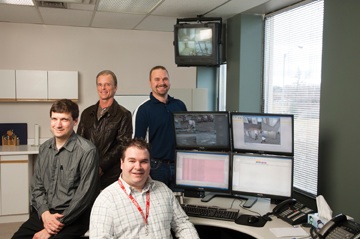
News
Ottawa central station owned by dealers
 When Thomas Smetana became fed up with the quality of service he was receiving from monitoring stations, he decided the only way to get what he wanted was to build it himself.
When Thomas Smetana became fed up with the quality of service he was receiving from monitoring stations, he decided the only way to get what he wanted was to build it himself.Central Station Security Services in Ottawa is a third-party monitoring centre owned by Smetana, his brother Dave and four other dealers, who all have shares in the company. The company has been in business for the last five years and recently became ULC-listed.
May 18, 2010 By Jennifer Brown
Smetana also owns and operates Canadian Security Team, a dealer/integration business.
“I have done everything when it comes to alarm monitoring and installation, so I’ve seen both sides of the business, which is unique. Most service dealers don’t have a clue what a monitoring station looks like or how it runs, and most operators or monitoring station staff don’t know what an installation sales division looks like,” he says.
Central Station Security Services offers a range of services including GPS tracking, remote video monitoring and managed access control monitoring — services typically only found in large central stations.
“We have found we can service the clients better by paying greater attention to detail,” says Smetana.
It was a lack of customer service that first drove Smetana to consider starting his own central station.
“We weren’t happy with anybody else who was out there monitoring our customers,” he says.
Smetana admits the model he has created is a little unconventional.
Smetana believes strongly in charging for what a service is worth and paying central station operators what they are worth too — ultimately the people answering the calls are the core of the business, especially when dealing with alarms in an emergency situation.
“I’ve always been of the belief that you can put $2 million worth of equipment in a central station and, if your operator is getting paid $8/hour, that’s the quality of service you’ll get. We pay our operators well — I’ve taken some from other companies, and they are getting more money starting with us than working 10 years with a previous employer.”
Remote video monitoring is a growing business segment right now for Smetana, mostly with commercial clients such as car dealerships but residential is still in the early stages.
“It’s definitely a huge business with all the police bylaws coming out, and that’s what’s driving it,” he says.
As hardware costs come down, the adoption of remote video verification in residential applications will become mainstream, says Smetana.
“If we had remote video monitoring to a point where we could patch in and verify the alarm, it would resolve a ton of issues for us as well as those in police departments and anyone responding to alarms.”
Once it becomes mainstream, the additional revenue attached to remote video verification will be a welcome revenue stream to an industry that has been seeing declining revenues.
“It will help the RMR, and quite frankly the industry needs it because alarm monitoring is starting to get to the point where dealers are going to start paying customers to be customers, because where do you go when you get to zero dollars?”
With their managed access control service, Smetana is giving customers a Kantech product which allows property management companies with 10 to 20 buildings to have an access control system that is monitored by the central station.
“If anyone needs a door unlocked or card changed, we can do it 24-hours a day and set them up on a pay-per-use service. If we unlock a door for them, it adds to the account bill. It’s good for big companies or even small clients who want an access control system but don’t want to invest in the control software,” says Smetana.
“We’ve had positive feedback on that.”
Print this page